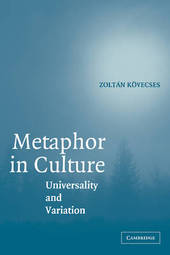
|
Metaphor in Culture: Universality and Variation
Paperback / softback
Main Details
| Title |
Metaphor in Culture: Universality and Variation
|
| Authors and Contributors |
By (author) Zoltan Koevecses
|
| Physical Properties |
| Format:Paperback / softback | | Pages:336 | | Dimensions(mm): Height 229,Width 152 |
|
| Category/Genre | linguistics
Sociolinguistics |
|---|
| ISBN/Barcode |
9780521696128
|
| Classifications | Dewey:306.44 |
|---|
| Audience | | Professional & Vocational | |
|---|
| Illustrations |
7 Tables, unspecified
|
|
Publishing Details |
| Publisher |
Cambridge University Press
|
| Imprint |
Cambridge University Press
|
| Publication Date |
4 December 2006 |
| Publication Country |
United Kingdom
|
Description
To what extent and in what ways is metaphorical thought relevant to an understanding of culture and society? More specifically: can the cognitive linguistic view of metaphor simultaneously explain both universality and diversity in metaphorical thought? Cognitive linguists have done important work on universal aspects of metaphor, but they have paid much less attention to why metaphors vary both interculturally and intraculturally as extensively as they do. In this book, Zoltan Koevecses proposes a new theory of metaphor variation. First, he identifies the major dimension of metaphor variation, that is, those social and cultural boundaries that signal discontinuities in human experience. Second, he describes which components, or aspects of conceptual metaphor are involved in metaphor variation, and how they are involved. Third, he isolates the main causes of metaphor variation. Fourth Professor Koevecses addresses the issue to the degree of cultural coherence in the interplay among conceptual metaphors, embodiment, and causes of metaphor variation.
Author Biography
Zoltan Koevecses is Professor of Linguistics, Department of American Studies, Eoetvoes Lorand University. He is the author of Metaphor and Emotion (2002), and Metaphor: A Practical Introduction (2000).
Reviews'The book is ... thorough and provides a good overview of existing theories before going on to develop these. ... an informative, readable and at times entertaining overview of metaphor and culture.' Psychologist 'It is well argued with a host of useful examples ... The book does provide a wealth of detailed and systematic theoretical material for those interested in how a cognitive approach of conceptual metaphors can usefully address variations in culture. I am sure that not only will it become a key resource for the cognitive linguistic researcher, but that all who study language in culture will find much to consider and reflect on.' Qualitative Research in Psychology
|